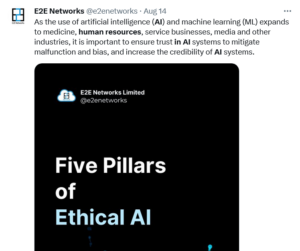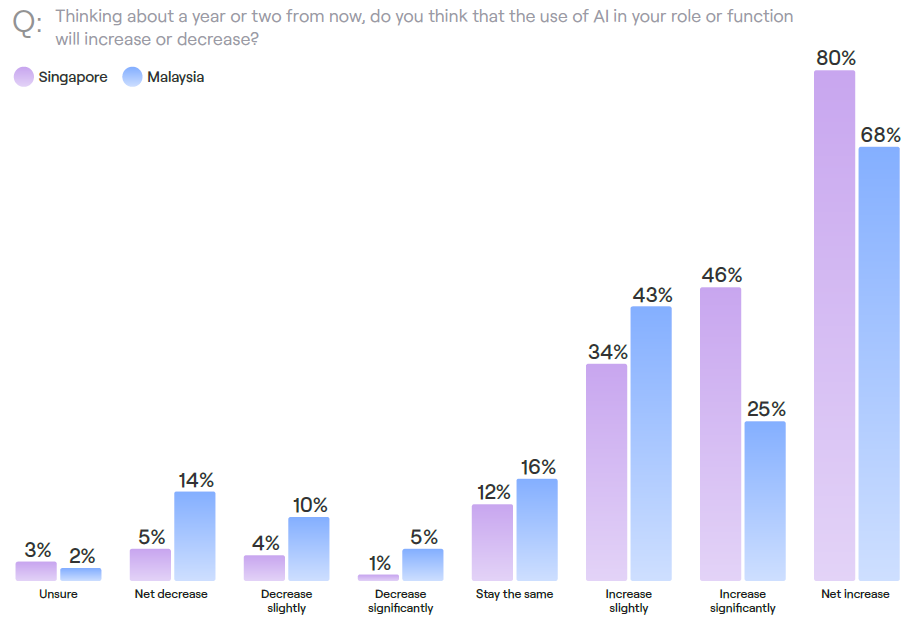
The AI dilemma in Malaysia’s HR landscape. (Source – Shutterstock)
Tackling the AI dilemma in Malaysia’s HR landscape
- Malaysia’s HR specialists have a dilemma – to embrace AI or not.
- Many companies are keen on AI, but have ethical and job concerns.
- Despite 99% of HR leaders adopting AI, Employment Hero’s report reveals concerns about privacy and transparency in HR methods.
While the Malaysian job market faces challenges, there’s a prevailing sentiment of hope among professionals concerning the potential of AI. They’re hopeful about its potential to enhance efficiency, employee output, and insightful analytics. But this enthusiasm also brings forth the AI dilemma—many human resources (HR) specialists are treading the line between embracing AI tools for greater efficiency and navigating concerns about privacy and ethics.
Malaysia’s government is making strides towards a comprehensive digital overhaul. It aims to ensure that the country secures a strong foothold in a competitive global scene, positioning itself as a digital vanguard and an economic leader in the region.
The government introduced the Malaysia Artificial Intelligence Roadmap 2021-2025 (AI-Rmap) to bolster this position. The initiative underscores the government’s intent to back businesses in their AI endeavors. However, they must first navigate hurdles like expertise shortage and financial constraints.
How AI is reframing HR dynamics
HR decision-makers in Malaysia have displayed a marked enthusiasm for integrating AI into their practices. A report by Employment Hero titled The SuperHuman: AI adoption, shaping the future of HR reveals that 82% view AI as a boon that can simplify their roles, with 38% foreseeing enhanced efficiency as its main advantage.
AI’s prowess in HR is manifold. It has already notably impacted recruitment processes, from listing jobs to finalizing offers, by trimming down manual labor. Furthermore, AI streamlines the employee induction process, ensuring seamless document verification, training initiation, and basic administrative duties management.
Beyond this, AI equips HR with the tools to closely observe and evaluate employee activities and engagement, offering crucial insights. By analyzing various employee communications and behaviors, AI can highlight potential issues like exhaustion or disengagement.
An overwhelming 71% of surveyed HR leaders are enthusiastic about AI’s capability to revolutionize their role. This suggests a broader desire to harness AI for mundane tasks, redirecting their professional focus towards strategic initiatives.
The survey further disclosed that 52% of managerial staff leverages AI for employee data analytics, while 58% of top-tier HR executives employ AI to gauge employee contribution.
There’s a pronounced AI application in the manufacturing, transportation, agriculture, and conservation sectors. It’s notable in areas such as employee data trend analysis (60%), HR content creation (60%), and ensuring adherence to HR and payment norms (58%).
The AI dilemma: Balancing efficiency and ethical concerns
While the dawn of AI paints a rosy picture of efficiency and innovation, the path isn’t without its thorns. A significant 55% of HR leaders are treading cautiously, all too aware of the Pandora’s Box AI might unlock. The question they’re grappling with is not just about what AI can do, but what it should do. The line between automation and ethical considerations is murky, especially when the implications touch on the very fabric of human work and identity.
Almost half (48%) of these leaders are staring at a double-edged sword. On one side, there’s the undeniable allure of automation — faster processes, reduced human error, and more. But on the flip side, there’s the looming specter of job losses. Could AI inadvertently push out human roles in its quest to streamline? This fear isn’t merely about job titles disappearing, but the broader social and economic repercussions it might herald.
Diving deeper into these apprehensions reveals a layered mosaic of concerns. Employee data privacy emerges as the prime worry for 42% of HR leaders. In an age where data is the new gold, how do businesses mine this resource without infringing upon an individual’s right to privacy?

Humans vs systems? The AI dilemma.
Following closely behind is the dilemma surrounding data security and storage, resonating with 37% of HR leaders. The nightmares of data breaches, with confidential employee information at risk, are enough to give any HR professional sleepless nights. Add to that the challenge of storing vast amounts of data securely and sustainably.
A quarter of HR leaders (26%) also raise red flags around trust and transparency. AI operates on algorithms, and not all of those are transparent or free from biases. There’s a growing chorus for “explainable AI” — systems where humans can understand and track decisions.

The AI dilemma – efficiency vs ethics.
Amid these swirling concerns, there’s a call for moderation. Half of the HR leaders advocate for a tempered approach towards AI, especially when it borders on uncharted experimental territories. They argue for a pause, a reflection, and perhaps even a recalibration.
Interestingly, while 50% of HR professionals seem to be pumping the brakes on aggressive AI endeavors, Malaysia stands out with a distinct voice of dissent. A notable 27% segment — the highest among surveyed countries — believes otherwise. This divergence is particularly evident in smaller enterprises, where the apprehensions of unforeseen consequences might counter the drive for innovation.
Malaysia and Singapore’s AI trajectories
Contrasting this with the Singaporean landscape offers another layer of insights. While Malaysian HR professionals share some concerns with their Singaporean counterparts, there’s a noticeable difference in their projected AI adoption rates. Malaysian experts, perhaps influenced by optimism and caution, foresee a more measured embrace of AI, as opposed to the more aggressive trajectory anticipated by Singapore.

Concerns surrounding AI experimentation. (Source – Employment Hero)
Kevin Fitzgerald, Managing Director Asia at Employment Hero, believes that while AI augments HR functions, it isn’t a substitute for the human touch. He suggests, “Rather than automating every process, AI should be used to streamline the manual, tedious aspects of HR processing. With more time back in the day, business can then focus on the more people-centric aspects of the job, and on other revenue driving initiatives.”
Fitzgerald believes the AI wave will permeate all sectors. He says that the onus is on businesses and HR heads to maximize its advantages while staying alert to potential pitfalls. He emphasizes the importance of continuous learning for ethical AI applications. When wielded adeptly, AI augments business processes and empowers employees to engage in human-centric roles like people management and culture-building, ultimately enhancing profitability.
Whether Malaysia embraces his view of AI in HR remains to be seen.
READ MORE
- 3 Steps to Successfully Automate Copilot for Microsoft 365 Implementation
- Trustworthy AI – the Promise of Enterprise-Friendly Generative Machine Learning with Dell and NVIDIA
- Strategies for Democratizing GenAI
- The criticality of endpoint management in cybersecurity and operations
- Ethical AI: The renewed importance of safeguarding data and customer privacy in Generative AI applications






